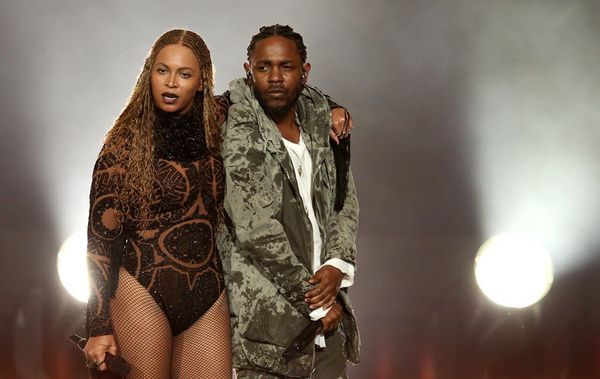
Did she just say … Kendrick Lamar? The satisfied little smile on Pulitzer prize administrator Dana Canedy’s face as she announced the final award of the afternoon confirmed what I thought I surely had misheard. In awarding the first Pulitzer for a hip-hop album and artist, the music jury, which included the jazz violinist Regina Carter and Columbia professor Farah Jasmine Griffin, cited Lamar’s “vernacular authenticity” and “affecting vignettes … on African-American life”. In other words, the boy can rap.
It has been an abundant week for black excellence: Black Panther was certified the third highest-grossing film in US box-office history; Beyoncé delivered a jaw-dropping performance at Coachella; and yes, Kendrick Lamar won a Pulitzer prize. We seem to be having a moment. But is it a moment of increased creativity, or just increased recognition for what we’ve been doing all along?
The surprise of Lamar’s win comes, in part, from the fact that the Pulitzers don’t announce finalists ahead of time. But there’s also, obviously, another element: no one expects a young black rapper to win one of the fanciest prizes in the land. Despite the fact that black Americans have long been at the vanguard of popular music and culture – evidenced, in part, by hip-hop overtaking rock this year to officially become the top-selling musical genre – there is still a gaping chasm between black artists’ creative achievements and how that work is acknowledged by the white mainstream.
Beyoncé’s riveting performance at Coachella last weekend is just one example. With her all-black marching band and string section, Formation-infused rendition of James Weldon Johnson’s “black national anthem” Lift Every Voice and Sing, and tireless vocals and choreography, she gave us a loving salute to historically black college culture that was not only artistically impressive, but a technical feat, with abundant pyrotechnics, a giant bleacher-style set, dozens of musicians and dancers in constant, meticulous motion, and top-level live video editing that is tough to get in a single take.
But she was also the first woman of colour to headline the festival in its 20-year history. She is the most beloved artist on the face of the planet, but had to watch Adele, a huge Beyoncé fan, reluctantly accept the 2017 Grammy for Album of the Year over her. In previous years, Beyoncé lost that award to Beck and to Taylor Swift.

There’s a reason Kanye West ran up to a different award stage, at the Video Music awards in 2009, to snatch the microphone from Taylor Swift to deem Beyoncé’s Single Ladies “one of the best videos of all time”– because mainstream institutions rarely give black artists their due. You can hold your breath waiting on that recognition; or you can take matters – and mics – into your own hands.
This reality harks back to what so many black children are taught by our parents: that we have to “work twice as hard to earn half as much”. That to succeed, compromises and considerations have to be made. Tina Knowles, in hearing her daughter’s idea for a Coachella show with an HBCU (historically black colleges and universities) theme for a mostly white audience, thought perhaps it would go over their heads. (And it did.) Beyoncé’s response? “At this point in my life and my career, I have a responsibility to do what’s best for the world and not what is most popular.”
If you know you might not ever get a top award for your work, perhaps that allows you the creative licence to do whatever you want. For Beyoncé, whose racial politics did not discernibly enter her work until Lemonade (2016), that has meant celebrating the Black Panthers at the Super Bowl and talking about police brutality in the Formation video. At Coachella, it meant creating her own sorority, “Beta Delta Kappa”, complete with step show and an initiation – for a “historically Beyoncé college or university”. As someone who attended an HBCU, it felt so good, so special, to be directly spoken to like that. Beyoncé said she hoped young people of all races would feel inspired to further research the references made in her performance. But she didn’t make that beautiful performance for everybody. She made it for us.
The same goes for Lamar and Damn. It’s an album that is explicitly political, openly black and undeniably good. His Pulitzer resonates, in part, because it’s a deviation from the norm of overlooking black artists for their unparalleled contributions to culture.
It is also a major institution’s belated acknowledgment of a genre that has been award-worthy for decades. For the Pulitzers, Grammys and others, the first person of colour to do something often happens long after the founding of the organisation. Though it’s exciting to see Lamar, Beyoncé, Ava DuVernay, Tiffany Haddish and Donald Glover be so publicly lauded, it does raise the question: why did it take so long?
Every year that black people and other marginalised groups get shut out from big awards (which could be every year), there are two reactions: the demand for inclusion, and the demand to “create our own awards”. There are those who seek the legitimising kiss of an Academy; and there are those who know it’s not by us, or for us.
The Pulitzer board’s “special citations”, which are only occasionally given, illustrate a telling pattern: Duke Ellington, John Coltrane and Thelonious Monk were only honoured long after their deaths; Alex Haley was cited for Roots in 1977 when he just as easily could have won for The Autobiography of Malcolm X. It reminds me of Spike Lee’s “special” Oscar awarded in 2015; it smacks of a consolation prize.
With someone as culturally invested as Lamar, it’s important to remember that a Pulitzer does not legitimate him, his work, or his art form. Though it be middle-aged, with a Harvard archive and research institute specialising in it, hip-hop has never needed formal recognition of its merits.
And for black artists, who so often get passed over for recognition, many times in favour of non-black artists doing approximately the same thing (see: Macklemore beating Lamar for best rap album at the 2014 Grammys), that distinction – a guest at the table, or seated at the head – might mean the difference between the freedom to create, and the hope that one day, that kiss will be for you.
It’s wonderful to see them celebrated and deified but Kendrick, Beyoncé, Lena Waithe, Jordan Peele, Cardi B, and so many more were creating works we love long before the establishment paid attention. In other words, if a black artist does her work in the woods and the white mainstream isn’t there to see it, doesn’t she still slay?










